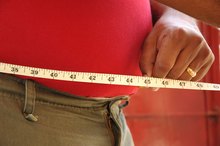What Causes Hard Belly Fat?
Your belly has too much fat, though it feels hard instead of jiggly. That’s because you have visceral fat—the type that develops deep inside your belly around your organs—as opposed to peripheral fat. Visceral fat around your middle raises your risk for heart disease, diabetes, cancer, stroke, high blood pressure and sleep apnea. Several factors contribute to hard belly fat.
Age and Sex
Your age is a factor in developing hard belly fat because as you get older your metabolism slows, meaning the rate at which your body burns calories goes down and your risk for accumulating excess fat goes up. The average person gains 1 to 2 pounds annually in the belly region between ages 35 and 55. As you age, your muscle mass decreases, which is significant because muscle burns more calories than fat. That means you may not increase your calorie intake but, because your body does not need as much fuel to maintain itself, the excess gets stored as fat. The onset of menopause sometimes leads to a shift in where your fat gets stored, from the thighs to the belly.
- Your age is a factor in developing hard belly fat because as you get older your metabolism slows, meaning the rate at which your body burns calories goes down and your risk for accumulating excess fat goes up.
Hormones
What Are the Causes of a Long Redundant Colon?
Learn More
Hormones play a role in whether your fat ends up deep in your belly or elsewhere, such as on your thighs. Cortisol, commonly known as one of your body’s stress hormones, promotes weight gain when you experience too much stress. Your bodily cortisol concentrations are controlled by an enzyme that’s located in fat cells, with visceral cells having more of these enzymes than subcutaneous cells. Having higher levels of these enzymes in your abdominal fat contributes to obesity because greater amounts of cortisol are being produced, says Christine A. Maglione-Garves in the University of New Mexico article, “Cortisol Connection.” Accumulating fat and higher cortisol levels in the body also are associated with a higher appetite, sugar cravings and weight gain, says Maglione-Garves. The hormone imbalance known as estrogen dominance also promotes belly fat gain, says physician Genie James, author of “From Belly Fat to Belly Flat.” Environmental estrogens, stress, poor diet, a sluggish liver, taking birth control pills and illness all may contribute to estrogen dominance.
- Hormones play a role in whether your fat ends up deep in your belly or elsewhere, such as on your thighs.
- Cortisol, commonly known as one of your body’s stress hormones, promotes weight gain when you experience too much stress.
Diet and Exercise
Lack of exercise and a poor diet both contribute to packing on visceral fat, according to Harvard Medical School. Work up to 30 to 60 minutes of moderate-intensity exercise daily, perform strength-training exercises a couple of times a week, and modify your diet to reduce your belly fat. Replace trans fats and saturated fats with polyunsaturated fats, and choose lean proteins. Consuming the wrong type of carbohydrates raises your risk for visceral fat. Increase complex carbohydrate intake and decrease refined carbohydrates in your diet, such as those in processed foods and white breads, to reduce your risk for accumulating visceral fat.
- Lack of exercise and a poor diet both contribute to packing on visceral fat, according to Harvard Medical School.
- Increase complex carbohydrate intake and decrease refined carbohydrates in your diet, such as those in processed foods and white breads, to reduce your risk for accumulating visceral fat.
False Fat
How to Pass the Military Body Fat Tape Test
Learn More
There is a chance that the hard fat around your middle isn’t actually fat—or isn’t all fat. Your belly might protrude from built-up waste in your colon, notes Jorge Cruise, author of “The Belly Fat Cure.” Eating the wrong kind of carbs makes you prone to this false fat in addition to raising risk for visceral fat, Cruise says. Consume carbohydrates that are high in fiber to promote regularity and to eliminate this false fat. You should have one to three bowel movements daily. Cruise recommends 25 g to 30 g of fiber daily, which you can gain by consuming six servings of complex carbs such as whole grains, fruits and veggies.
- There is a chance that the hard fat around your middle isn’t actually fat—or isn’t all fat.
- Eating the wrong kind of carbs makes you prone to this false fat in addition to raising risk for visceral fat, Cruise says.
Related Articles
References
- “The Belly Fat Cure”; Jorge Cruise; 2010
- Harvard Medical School: Abdominal Fat and What to Do About it
- University of New Mexico: “Cortisol Connection: Tips on Managing Stress and Weight”; Christine A. Maglione-Garves et al.
- Assessing Your Weight. Centers for Disease Control and Prevention.
- American Council on Exercise. ACE Health Coach Manual. 2013.
- American Council on Exercise. ACE Personal Trainer Manual. 2012.
Resources
Writer Bio
Linda Tarr Kent is a reporter and editor with more than 20 years experience at Gannett Company Inc., The McClatchy Company, Sound Publishing Inc., Mach Publishing, MomFit The Movement and other companies. Her area of expertise is health and fitness. She is a Bosu fitness and stand-up paddle surfing instructor. Kent holds a bachelor's degree in journalism from Washington State University.









